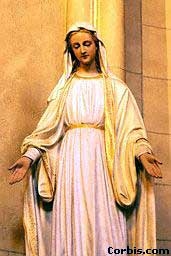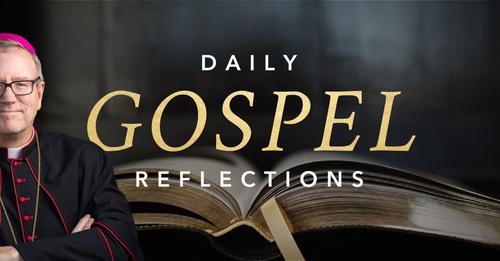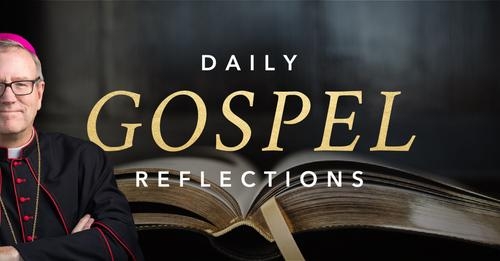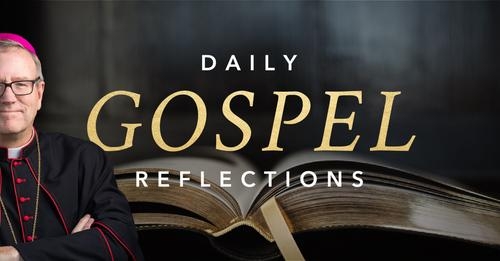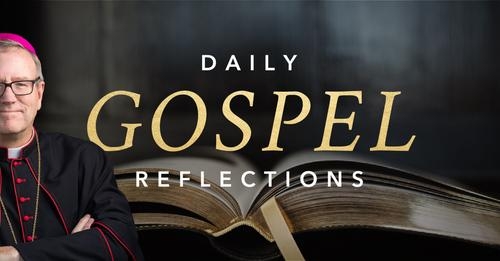Friday, December 13, 2024
Bishop Robert Barron
Cycle C
Advent
2nd wk of Advent
Topics
Fellowship
Last Supper
Passover
Saints
Saint Lucy
Bible References
Matthew 11:16-19
Friends, in today’s Gospel, Jesus says, “The Son of Man came eating and drinking and they said, ‘Look, he is a glutton and a drunkard, a friend of tax collectors and sinners.’”The Passover meal was decisively important in salvation history. God commands that his people share a meal to remember their liberation from slavery. This supper provides the context for the deepest theologizing of the Israelite community. Both the bitterness of their slavery and the sweetness of their liberation are acted out in this sacred meal.Jesus’ life and ministry can be interpreted in light of this symbol. From the very beginning, Jesus was laid in a manger, for he would be food for a hungry world. Much of Jesus’ public outreach centered on sacred meals, where everyone was invited: rich and poor, saints and sinners, the sick and the outcast. They thought John the Baptist was a weird ascetic, but they called Jesus a glutton and a winebibber. He embodies Yahweh’s desire to eat a convivial meal with his people.And of course, the life and teaching of Jesus comes to a sort of climax at the meal that we call the Last Supper. The Eucharist is what we do in the in-between times, between the death of the Lord and his coming in glory. It is the meal that even now anticipates the perfect meal of fellowship with God.
Gospel Reflections
Meditate on Daily Gospel Reflections from Bishop Robert Barron
Bishop Robert Barron
Cycle C
Advent
2nd wk of Advent
Topics
Fellowship
Last Supper
Passover
Saints
Saint Lucy
Bible References
Matthew 11:16-19
Friends, in today’s Gospel, Jesus says, “The Son of Man came eating and drinking and they said, ‘Look, he is a glutton and a drunkard, a friend of tax collectors and sinners.’”The Passover meal was decisively important in salvation history. God commands that his people share a meal to remember their liberation from slavery. This supper provides the context for the deepest theologizing of the Israelite community. Both the bitterness of their slavery and the sweetness of their liberation are acted out in this sacred meal.Jesus’ life and ministry can be interpreted in light of this symbol. From the very beginning, Jesus was laid in a manger, for he would be food for a hungry world. Much of Jesus’ public outreach centered on sacred meals, where everyone was invited: rich and poor, saints and sinners, the sick and the outcast. They thought John the Baptist was a weird ascetic, but they called Jesus a glutton and a winebibber. He embodies Yahweh’s desire to eat a convivial meal with his people.And of course, the life and teaching of Jesus comes to a sort of climax at the meal that we call the Last Supper. The Eucharist is what we do in the in-between times, between the death of the Lord and his coming in glory. It is the meal that even now anticipates the perfect meal of fellowship with God.
Gospel Reflections
Meditate on Daily Gospel Reflections from Bishop Robert Barron
Friday, December 13, 2024
Bishop Robert Barron
Cycle C
Advent
2nd wk of Advent
Topics
Fellowship
Last Supper
Passover
Saints
Saint Lucy
Bible References
Matthew 11:16-19
Friends, in today’s Gospel, Jesus says, “The Son of Man came eating and drinking and they said, ‘Look, he is a glutton and a drunkard, a friend of tax collectors and sinners.’”The Passover meal was decisively important in salvation history. God commands that his people share a meal to remember their liberation from slavery. This supper provides the context for the deepest theologizing of the Israelite community. Both the bitterness of their slavery and the sweetness of their liberation are acted out in this sacred meal.Jesus’ life and ministry can be interpreted in light of this symbol. From the very beginning, Jesus was laid in a manger, for he would be food for a hungry world. Much of Jesus’ public outreach centered on sacred meals, where everyone was invited: rich and poor, saints and sinners, the sick and the outcast. They thought John the Baptist was a weird ascetic, but they called Jesus a glutton and a winebibber. He embodies Yahweh’s desire to eat a convivial meal with his people.And of course, the life and teaching of Jesus comes to a sort of climax at the meal that we call the Last Supper. The Eucharist is what we do in the in-between times, between the death of the Lord and his coming in glory. It is the meal that even now anticipates the perfect meal of fellowship with God.
Gospel Reflections
Meditate on Daily Gospel Reflections from Bishop Robert Barron
0 Comments
0 Shares
774 Views





